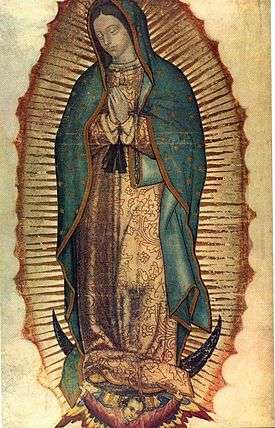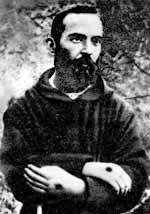Visions of Jesus and Mary
Since the Crucifixion of Jesus Christ on Calvary, a number of people have claimed to have had visions of Jesus Christ and personal conversations with him. Some people make similar claims regarding his mother, the Blessed Virgin Mary. Discussions about the authenticity of these visions have often invited controversy. The Catholic Church endorses a fraction of these claims, and various visionaries it accepts have achieved beatification, or even sainthood.
The very first reported visions of Christ, and personal conversations with him, after his resurrection and prior to his ascension are found in the New Testament. One of the most widely recalled Resurrection appearances of Jesus is the doubting Thomas conversation (John 20:24-29) between him and Thomas the Apostle after his death. The last book of the Bible itself is based on a series of visions. In the Book of Revelation, the author, often identified as John of Patmos, recorded visions that became part of the New Testament.
Acceptance and impact
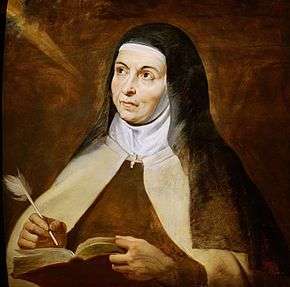
Some visions predate the Protestant Reformation, yet among Christian denominations, the Catholic Church has made more formal comments on visions of Jesus and the Virgin Mary. Author Michael Freze argues that Catholic practices such as Eucharistic adoration, rosary devotions and contemplative meditation with a focus on interior life facilitate visions and apparitions.[1] The first step in the mysticism of Saint Teresa of Ávila, a Doctor of the Church who reported extensive visions, was "mental prayer", i.e. devout contemplation or concentration, the withdrawal of the soul from without and specially the devout observance of the passion of Christ and penitence (Autobiography 11.20).[2]
In recent centuries, people reporting visions of Jesus have been of diverse backgrounds: laity and clergy, young and old, Catholics and Protestants, devout or casual believers.[3]
Vatican guidelines
The Sacred Congregation for the Doctrine of the Faith at the Vatican has published a detailed set of steps for "Judging Alleged Apparitions and Revelations" that claim supernatural origin.[4]
After some time and detailed examinations, the Holy See has, however, recognized a few post-Ascension conversations with Jesus as valid. In his 1928 encyclical Miserentissimus Redemptor Pope Pius XI stated that Jesus Christ had "manifested Himself" to Saint Margaret Mary Alacoque in the 17th Century. The encyclical refers to the conversation between Jesus and Saint Margaret Mary several times. The Vatican biography of Saint Teresa of Ávila refers to her gift of interior locution and her conversations with Jesus. The Vatican biography of Saint Juan Diego discusses his conversation with the Virgin Mary. The Vatican biography of Saint Faustina Kowalska not only refers to her conversations with Jesus, but quotes some of these conversations.
As a historical pattern, Vatican approval seems to have followed general acceptance of a vision by well over a century in most cases. The reported visions of Jesus and Mary by Benoite Rencurel in Saint-Étienne-le-Laus in France from 1664 to 1718 were only recognized by the Holy See in May 2008, making them the first Marian apparitions and visions of Jesus to be approved in the 21st century. According to Father Salvatore M. Perrella of the Mariunum Pontifical Institute in Rome, this is the 12th Marian apparition approved by the Holy See from a total of 295 that have been studied through the centuries.[4][5]
Controversies
Many visions of Jesus following his ascension have been reported after the Book of Revelation was written. But the Book of Revelation itself specifically mentions the case of “false prophets” (Rev 19:20) and undoubtedly not everyone claiming to converse with Jesus can be believed. Over the years, a number of people claiming to converse with Jesus for the sake of monetary gain have been exposed. A well-known example was the Charismatic Protestant televangelist Peter Popoff who often claimed to receive messages from God to heal people on stage. Popoff was debunked in 1987 when intercepted messages from his wife to a small radio receiver hidden in his ear were replayed on the Johnny Carson national television show.[6][7]
Another example is messages from Jesus reported by Catalina Rivas, which have been exposed in a number of cases as less than truthful.[8] A number of messages which Rivas reported as having been received from God were later found to correspond to exact pages of books previously written by other authors (e.g. José Prado Flores), and published instructional literature for Catholic seminarians.[9]
Some reported messages from the Virgin Mary have also involved controversy. Reported Marian messages from Veronica Lueken were declared invalid by Bishop Francis Mugavero of the Roman Catholic Diocese of Brooklyn[10] and reports of Our Lady of Surbiton claiming that the Virgin Mary appeared every day under a pine tree in England were flatly rejected by the Vatican as a fraud.[11]
The Catholic Church has, at times, taken a harsh view of some people who have claimed religious visions. In December 1906, during the reign of Pope Pius X the former Polish nun Feliksa Kozlowska became the first woman in history to be excommunicated by name as a heretic. Some visions of Jesus have simply been classified as hallucinations by the Church, while in a few cases the Church has chosen to remain silent on the authenticity of claimed visions.
Influence
Despite the expected controversies, post-Ascension visions of Jesus and the Virgin Mary have, in fact, played a key role in the direction of the Catholic Church, e.g. the formation of the Franciscan order and the devotions to the Holy Rosary, the Holy Face of Jesus and the Sacred Heart of Jesus. Key elements of modern Roman Catholic Mariology have been influenced by visions reported by children at Lourdes and Fatima.
Reported messages from Jesus have also influenced papal actions and encyclicals. For instance, the 1899 consecration of the world to the Sacred Heart of Jesus by Pope Leo XIII in the encyclical Annum sacrum was due to the messages from Jesus reported by a nun, Blessed Mary of the Divine Heart Droste zu Vischering. Pope Leo XIII performed the requested consecration a few days after the death of Sister Mary and called it "the greatest act of my pontificate".[12]
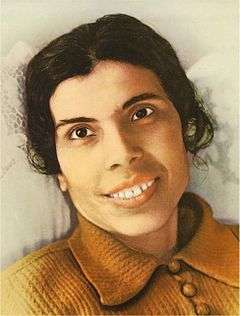
Also Blessed Alexandrina of Balazar, in Portugal, reported many private apparitions, messages and prophecies received directly from Jesus and Virgin Mary. In June 1938, based on the request of her spiritual director Father Mariano Pinho, several bishops from Portugal wrote to Pope Pius XI, asking him to consecrate the world to the Immaculate Heart of Mary. At that time Cardinal Eugenio Pacelli (later Pope Pius XII) was the secretary of the state of the Vatican, and he later performed the consecration of the world.[13]
Some visions have helped maintain the strength of the Catholic Church through the centuries before being accepted by the Vatican. Saint Juan Diego's reported vision of Our Lady of Guadalupe in Mexico in 1531 was instrumental in adding almost 8 million people to the ranks of Catholics between 1532 and 1538, right in the midst of the Protestant Reformation of 1521 to 1579 which saw a large number of people leave the Catholic Church in Europe. Juan Diego was declared venerable in 1987.
Pilgrimages
Churches built based on reported visions of Jesus and Mary attract many millions of pilgrims each year. According to Bishop Francesco Giogia the majority of the most visited Catholic shrines in the world are vision based, in that with about 10 million pilgrims, in 1999 the Basilica of Our Lady of Guadalupe in Mexico City was the most visited Catholic shrine in the world, followed by San Giovanni Rotondo in Italy and Our Lady of Aparecida in Brazil, each with about 6 to 7 million pilgrims per year.[14][15] Given about 5 million visitors per year to Our Lady of Lourdes and 4 million to Our Lady of Fátima, the major vision based churches receive over 30 million pilgrims per year.
Predictions
Some of the reported visions of Jesus simply fade away by virtue of predictions that fail to materialize. On the other hand, some predictions based on visions continue to gather interest decades after they were made. Messages from Jesus reported by John Leary in Rochester New York in 1999 had predicted that Pope John Paul II would be forced out of Rome and sent into exile amid chaos. Bishop Matthew Clark of the Roman Catholic Diocese of Rochester disallowed these messages at the time, but with the election of Pope Benedict XVI the debate about the validity of these messages seems to have been rendered moot.
On August 19, 1982, some teenagers in Kibeho, Rwanda reported visions of the Blessed Virgin Mary and Jesus Christ, as Our Lady of Kibeho. The teenagers reported truly gruesome sights such as rivers of blood and the visions were accompanied by intense reactions: crying, tremors, and comas. Some today regard the visions as an ominous prediction of the Rwandan Genocide of 1994, and particularly in that specific location in 1995 in which some of the teenagers died a decade after their vision. The apparitions were accepted by the local Roman Catholic bishop but have not been given final approval by the Holy Office.[16][17]
Visions of the early saints
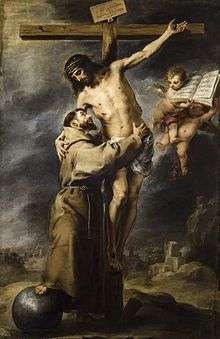
The Bible includes primarily pre-Ascension visions of Jesus, except for the vision of Christ by Saint Stephen just before his death (Acts 7:55), the road to Damascus voice heard by Saint Paul and the conversation between Jesus and Saint Ananias in Damascus in which Saint Ananias is ordered to heal Saint Paul (Acts 9:10-18).[18] The Damascus appearance is the last reported vision of Jesus in the Bible until the Book of Revelation was written. However, in the following centuries, many saints reported visions of both Jesus and the Blessed Virgin Mary.
In 1205, while praying in the Church of San Damiano just outside Assisi, Saint Francis of Assisi reported a vision in which an image of Jesus came alive and told him: "Francis, Francis, go and repair My house which, as you can see, is falling into ruins." This vision lead Saint Francis to renounce the outlook of his merchant family, embrace poverty and form the Franciscan order. The Franciscans became a key force in the renewal of the reach of Christianity. During another vision in 1224 Saint Francis reportedly received the very first recorded case of stigmata.
Starting in 1208, Saint Juliana of Liege had visions of Christ which she kept a secret for almost 20 years. In these visions she was reportedly told to institute a solemn feast for the Blessed Sacrament as the Body of Christ. When she eventually reported her visions to her confessor, the information was relayed to the bishop. Years later, in 1264, Pope Urban IV (who was formerly the Archdeacon of Liege) formally declared the feast of Corpus Christi for the whole Latin Rite, as the first papally sanctioned universal feast for the Latin Rite.[19]
The Blessed Virgin Mary is traditionally said to have appeared to the English Carmelite priest St. Simon Stock in 1251, and given him the Carmelite habit, the Brown Scapular, with a promise that those who die wearing it will be saved. Also known as the Scapular of Our Lady of Mount Carmel, the brown scapular is perhaps the best known, and most widespread of all small scapulars.

Saint Catherine of Siena was a withdrawn Dominican tertiary who lived, fasted and prayed at home in Siena Italy. In 1366, when she was 19 years old she reported her first vision of Jesus after which she started to tend to the sick and the poor. In 1370 she reported a vision in which she was commanded to abandon her life of solitude and to make an impact on the world. She corresponded with Pope Gregory XI and other people in authority, begging for peace and for the reformation of the clergy, writing over 300 letters. Her arguments, and her trip to Avignon, eventually became instrumental in the decision of Pope Gregory XI to return the Avignon Papacy to Rome where she was summoned to live until her death. She is one of only three female Doctors of the Church.
In 1372 Saint Julian of Norwich was on her deathbed and had been given her last rites when she reported a series of visions of Jesus, followed by a sudden recovery. Almost twenty years later she wrote about these visions in her book “Sixteen Revelations of Divine Love” perhaps the first book in the English language written by a woman, presumably because she was unfamiliar with Latin. Her book mentions her illness and her recovery as she saw the shining image of Christ. The sixteen revelations start with the crown of thorns and proceed through the death of Jesus, ending with his resurrection and how Christ still dwells in the souls of those who love him. She is celebrated in the Anglican Church.
In 1531, Saint Juan Diego reported an early morning vision of the Virgin Mary in which he was instructed to build an abbey on the Hill of Tepeyac in Mexico. The local prelate did not believe his account and asked for a miraculous sign, which was later provided as an icon of Our Lady of Guadalupe permanently imprinted on the saint’s cloak where he had gathered roses. Over the years, Our Lady of Guadalupe became a symbol of the Catholic faith in Mexico. By 1820 when the Mexican War of Independence from Spanish colonial rule ended Our Lady of Guadalupe had come to symbolize the Mexican nation. Today it remains a strong national and religious symbol in Mexico.
On St. Peter's Day in 1559, Saint Teresa of Avila (Teresa de Jesús) reported a vision of Jesus present to her in bodily form. For almost two years thereafter she reported similar visions. Saint Teresa’s visions transformed her life and she became a key figure in the Catholic Church eventually being recognized as one of only three female Doctors of the Church. One of her visions is the subject of Bernini's famous work The Ecstasy of St Theresa in the basilica of Santa Maria della Vittoria in Rome.
In the early 17th century, Venerable María de Jesús de Ágreda reported a number of mystical experiences, visions and conversations with the Blessed Virgin Mary. She stated that the Blessed Virgin had inspired and dictated passages in the book Mystical City of God as a biography of the Virgin Mary. The book Mystical City of God is still frequently studied in college and university programs of Spanish language and culture. However, the book (which makes a number of somewhat unusual claims) has remained controversial within the Roman Catholic church, having been banned and restored a number of times, and her process of beatification (started in 1673) has not been completed.[20][21]
From 1673 to 1675, Saint Marguerite Marie Alacoque recounted a series of visions of Christ speaking to her. In December 1673 she reported that Jesus permitted her to rest her head upon his heart, and then disclosed to her the wonders of his love. This led her to the founding of the Devotion of the Sacred Heart. Initially, her life, actions, beliefs and writings became the subject of extreme scrutiny by the Catholic Church. However, she was eventually declared a saint in 1920 and the Feast of the Sacred Heart is now officially celebrated 19 days after Pentecost.
At her profession as a Capuchin Poor Clare nun in 1678, Saint Veronica Giuliani expressed a great desire to suffer in union with the crucified Jesus for the conversion of sinners.[22] Shortly after that time she reported a series of vision of Jesus and the Virgin Mary that lasted a number of years. She reported a vision of Christ bearing his cross and of the chalice symbolizing the Passion of Christ. On Good Friday 1697 she received the five wounds of Christ as stigmata.[23]
19th Century visions

Blessed Anne Catherine Emmerich was a German Augustinian nun who lived from 1774 to 1824. She was bedridden as of 1813 and is said to have had visible stigmata which would reopen on Good Friday. She reported that since childhood she had visions in which she talked with Jesus. In 1819 the poet Clemens Brentano was inspired to visit her and began to write her visions in his words, with her approval. In 1833, after her death, the book The Dolorous Passion of Our Lord Jesus Christ was released by Brentano and was used in part by Mel Gibson for his movie The Passion of the Christ in 2004. In 1852 the book The Life of The Blessed Virgin Mary was published. Emmerich's visions allegedly led a French priest Abbé Julien Gouyet to discover a house near Ephesus in Turkey in 1881. This house is assumed by some Catholics and some Muslims to be the House of the Virgin Mary. The Holy See has taken no official position on the authenticity of the discovery yet, but in 1896 Pope Leo XIII visited it and in 1951 Pope Pius XII initially declared the house a Holy Place. Pope John XXIII later made the declaration permanent. Pope Paul VI in 1967, Pope John Paul II in 1979 and Pope Benedict XVI in 2006 visited the house.
In 1820, Joseph Smith, Jr., founder of the Latter Day Saint movement, reported that the Father and the Son appeared to him in a vision in the woods near his home in rural New York. This led to a series of other manifestations through which he claimed to receive divine instruction, authority, and power to restore the true Church of Jesus Christ to the world. He also claimed to receive a vision of Jesus while in the Kirtland Temple on April 3, 1836. His record of the revelation has since become known as the 110th section of the Doctrine and Covenants.[24]

In 1843 Sister Marie of St Peter, a Carmelite nun in Tours France reported visions of conversations with Jesus and the Virgin Mary in which she was urged to spread the devotion to the Holy Face of Jesus, in reparation for the many insults Jesus suffered in his Passion. This resulted in the Golden Arrow Prayer.[25] The devotion was further spread from Tours partly by the efforts of the Venerable Leo Dupont (also called the Apostle of the Holy Face) and influenced Saint Therese of Lisieux.[26]

In 1858 Saint Bernadette Soubirous was a 14-year-old shepherd girl who lived near the town of Lourdes in France. One day she reported a vision of a miraculous Lady who identified Herself as the Virgin Mary in subsequent visions.[27] In the first vision she was asked to return again and she had 18 visions overall. According to Saint Bernadette, the Lady held a string of Rosary beads and asked Saint Bernadette to drink water from the spring nearby and to request that the local priests build a chapel at that site of the visions. Eventually, a number of chapels and churches were built at Lourdes as the Sanctuary of Our Lady of Lourdes - which is now a major Catholic pilgrimage site. One of these churches, the Basilica of St. Pius X can accommodate 25 thousand people and was dedicated by the future Pope John XXIII when he was the Papal Nuncio to France.
In 1866 Venerable Marie Martha Chambon began to report visions of Jesus telling her to contemplate the Holy Wounds, although it is said that she had received her first vision when only five years old.[28] She was a member of the Monastery of the Visitation Order who lived in Chambéry, France, and is in the process of canonization by the Roman Catholic Church.
In 1899 Saint Gemma Galgani reported a vision of Jesus after which she experienced recurring stigmata. She reported the vision as follows: “At that moment Jesus appeared with all his wounds open, but from these wounds there no longer came forth blood, but flames of fire. In an instant these flames came to touch my hands, my feet and my heart.” Thereafter she reported receiving the stigmata every week from Thursday night to Saturday morning, during which time she also reported further conversations with Jesus. The Congregation of Rites has so far refrained from making a decision on her stigmata.
20th Century visionaries
The Franciscan Italian priest Saint Pio of Pietrelcina reported visions of both Jesus and Mary as early as 1910. For a number of years he claimed to have experienced deep ecstasy along with his visions. In 1918, while praying in the Church of Our Lady of Grace he reported ecstasy and visions which this time left him with permanent and visible stigmata, the five wounds of Christ. The stigmata remained visible on his hands and feet for the next fifty years.
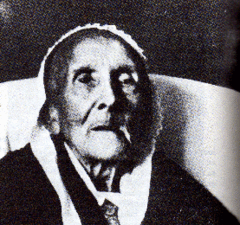
In 1916, during World War I, Claire Ferchaud — in religion Sister Claire of Jesus Crucified — lived in the Convent of the ‘Rinfilières’ at Loublande, France. At that time, she claimed to have been given a vision of Christ himself showing his heart "slashed by the sins of mankind" and crossed by a deeper wound still, atheism. On 12 March 1920, however, a decree of the Holy Office disavowed her revelations and stated that belief in the visions of Loublande could not be approved. The Archbishop of Paris, Cardinal Léon-Adolphe Amette declared that regretfully he was unable to discover a supernatural inspiration in her statements.[29]
The visions of the Virgin Mary appearing to three shepherd children at Fátima, Portugal, in 1917 were declared "worthy of belief" by the Catholic Church in 1930 but Catholics at large are not formally required to believe them. However, five popes — Pius XII, John XXIII, Paul VI, John Paul II and Benedict XVI — have supported the Fátima messages as supernatural. Pope John Paul II was particularly attached to Fátima and credited Our Lady of Fátima with saving his life after he was shot in Rome on the Feast Day of Our Lady of Fátima in May 1981. He donated the bullet that wounded him on that day to the Roman Catholic Sanctuary of Fátima, in Portugal. Every year on May 13 and October 13, the significant dates of Fatima apparitions, pilgrims fill the country road that leads to the Sanctuary of Our Lady of Fátima with crowds that approach one million on each day.[30]

The Holy See has, at times, reversed its position on some visions. In 1931 Saint Faustina Kowalska reported visions of a conversation with Jesus when she was a Polish nun. This resulted in the Chaplet of Divine Mercy as a prayer and later an institution which was condemned by the Holy See in 1958. However, further investigation resulted in her beatification in 1993 and canonization in 2000. Her conversations with Jesus are recorded in her diary, published as "Divine Mercy in My Soul" - passages from which are at times quoted by the Vatican. Divine Mercy Sunday is now officially celebrated as the first Sunday after Easter.

On the first Friday in Lent 1936, Sister Maria Pierina De Micheli, a nun born near Milan in Italy, reported a vision in which Jesus told her: “I will that My Face, which reflects the intimate pains of My Spirit, the suffering and the love of My Heart, be more honored. He who meditates upon Me, consoles Me”. Further visions reportedly urged her to make a medal with the Holy Face. In 1958, Pope Pius XII confirmed the Feast of the Holy Face of Jesus as Shrove Tuesday (the Tuesday before Ash Wednesday) for all Roman Catholics. Maria Pierina De Micheli was beatified by Benedict XVI in 2009.[31]
From 1944 to 1947 the bed ridden Italian writer and mystic Maria Valtorta produced 15,000 handwritten pages of text that she said recorded the visions of her conversations with Jesus about his life and the early church. These pages became the basis of her book The Poem of the Man God. The Catholic Church placed it on the Index of Forbidden Books. While the Index no longer exists, the then-Cardinal Joseph Ratzinger stated in a letter of January 31, 1995 that the condemnation still "retains its moral force", and the Congregation for the Doctrine of the Faith declared that the visions "cannot be considered supernatural in origin."
Some people who are said to have received interior locutions or messages from Jesus prefer not to discuss them in detail. For instance, while the Vatican biography of Blessed Mother Teresa of Calcutta refers to her interior locutions and messages from Jesus, she often referred to them in terms of a “call within a call”.
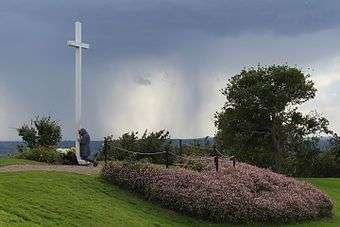
Between 1972 and 1978, Jesus Christ is said to have appeared 49 times in Dozulé to Madeleine Aumont,[32][33] a mother of five children, in the presence of her parish priest Victor L’Horset and other faithful people, and is believed to have dictated a series of messages, containing teachings and of warnings for all people, according to those who believe in them. Among them is the daily «Prayer of Dozulé».[34] The messages are seen as an annunciation of the return of Christ. The construction of the «Glorious Cross», an illuminated Catholic cross coloured white and blue, 738m tall with arms 123m long, which means with an exact proportion of a ratio of 3 between the vertical and horizontal length, is seen as a sign of it. The followers of the messages of Dozulé believe also that they are the continuation of the Three Secrets of Fátima and that they ask, for the conversion of humanity to avoid a material and spiritual catastrophe.
Living visionaries
Among recent visions, the reported apparitions of The Virgin Mary to six children in Međugorje in 1981 have received the widest amount of attention. The messages of Our Lady of Međugorje have a very strong following among Catholics worldwide. The Holy See has never officially either approved or disapproved of the messages of Međugorje, although both critical and supportive documents about the messages have been published by various Catholic figures.
For several decades, Sister Agnes Katsuko Sasagawa had encountered many health problems but her health reportedly improved after drinking water from Lourdes. After going totally deaf, she went to live with the nuns in the remote area of Yuzawadai, near the city of Akita. In 1973 she reported messages from the Virgin Mary, as well as stigmata. These purported visions are known as Our Lady of Akita. On April 22, 1984, after eight years of investigations, Rev. John Shojiro Ito, Bishop of Niigata, Japan, recognized "the supernatural character of a series of mysterious events concerning the statue of the Holy Mother Mary" and authorizes "throughout the entire diocese, the veneration of the Holy Mother of Akita, while awaiting that the Holy See publishes definitive judgment on this matter."[35]
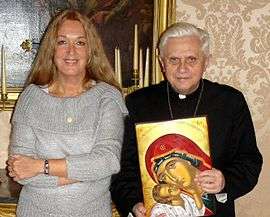
As recently as 1985 other people such as Vassula Ryden have reported conversations of theirs with Jesus in their books, resulting in interest, discussion and controversy. Ryden’s reported conversations with Jesus are published in a series of books called “True Life in God” and have been translated to over 40 languages by volunteers worldwide. In a 1995 notification the Congregation for the Doctrine of the Faith, while recognizing some positive aspects of Ryden's activities, declared that their negative effects meant that dioceses should not provide opportunities for spreading her ideas and that Catholics should not consider her writings to be supernatural.[36] A further letter from the Congregation written on January 25, 2007, by the new Prefect Cardinal William Levada and this time sent worldwide to all the Catholic episcopal conferences, confirmed the 1995 negative doctrinal evaluation of the writings of which it spoke; stated that, in view of the clarifications offered, a case by case judgement should be passed on the possibility for Catholics to read her writings "presented not as divine revelations but rather as her personal meditations"; and declared it inappropriate for Catholics to participate in her prayer groups.[37]
In the book Visions of Jesus Phillip Wiebe chronicled the stories of 30 people from truly diverse backgrounds who claim to have had recent conversations with Jesus. Wiebe analyzed these claims from multiple perspectives, including hallucinations, dreams and real visions.[38]
Types of visions
Visions vs dictations
Some visionaries merely report conversations and images while others also produce large amounts of handwritten notes. Saint Julian of Norwich wrote a book based on her reported visions, the book was written twenty years after her first vision and she did not declare it to be a dictation. At the other end of the spectrum is the case of Blessed Anne Catherine Emmerich who narrated her messages to Klemens Brentano, who transcribed them in his own words. Another case was that of Sister Consolata Betrone who would repeat her reported conversations with Jesus to her confessor Father Lorenzo Sales. After her death, Father Sales wrote the book "Jesus Appeals to the World" based on her reported messages.[39]
Visions should also be differentiated from interior locutions in which inner voices are reported, but no visual or physical contact is claimed. For instance, the messages written by Father Stefano Gobbi for the Marian Movement of Priests are reported as interior locutions rather than visions. The same happened with the messages received by Mother Carmela Carabelli.
There have been other mystics who have produced large volumes of text, but considered them meditations rather than visions or interior locutions. For instance, the Venerable Concepcion Cabrera de Armida's over 60,000 pages of text were never represented as visions, but as her own meditations, often in the presence of the Blessed Sacrament, during Eucharistic Adoration.
Physical marks
Some visionaries report receiving physical signs on their bodies as they experience visions. Saint Francis of Assisi was one of the first reported cases of stigmata, but the best known recent example is a Capuchin, Saint Padre Pio, one of several Franciscans in history with reported stigmata.[40]
Physical contact
Some visionaries have reported physical contact with Jesus. The Bible suggests that post-resurrection (yet pre-ascension) physical contact with Jesus is possible, for in John 21:17 Jesus told Saint Mary Magdalene: ”Don’t touch Me for I have not yet ascended to the Father”. In John 20:27 Jesus ordered Saint Thomas the Apostle: “Put your hand into My side”. But the Bible does not mention if Saint Thomas followed that command. Saint Marguerite Marie Alacoque reported putting her head on the heart of Jesus.
Physical artifacts
Some visionaries produce artifacts based on their reported visions, although this is rare. A well-known example is the image of Our Lady of Guadalupe which is reported to have been miraculously imprinted on the cloak of Saint Juan Diego.
Unreported visions
Some visions remain partially reported, or unreported. For instance, Saint Juliana of Liege kept her reported visions of Christ a secret for almost 20 years and then revealed some of them to her confessor. Years later, her visions were the subject of the papal bull Transiturus de hoc mundo which established the feast of Corpus Christi. However, in the meantime, due to a conflict with a local church official, she was driven out of Liege and lived in seclusion at Fosses-la-Ville until she died. On her deathbed she asked for her confessor, supposedly to reveal to him some secrets regarding her visions. But neither he nor any of her friends from Liege arrived and other secrets regarding her visions remain unknown.[41]
Similar and interlinked visions
The case of Saint Juan Diego's vision in 1531 is somewhat similar to the case of Saint Bernadette Soubirous's vision in 1858.[42][43] Both saints reported a miraculous Lady on a hill who asked them to request that the local priests build a chapel at the site of the vision. Both visions included a reference to roses and led to large churches being built at the sites. Like Our Lady of Guadalupe in Mexico, Our Lady of Lourdes is a major Catholic symbol in France.[44][45]
See also
References
- ↑ Freze, 1993, p. 91.
- ↑ Teresa of Avila The Life of Teresa of Jesus: The Autobiography of Teresa of Avila Doubleday, 1991 ISBN 978-0385011099 p. 20
- ↑ Wiebe, Phillip H. Visions of Jesus, 1998, Oxford University Press ISBN 0-19-512669-6 page vii
- 1 2 "Expert explains Church’s criteria for confirming Marian apparitions", Catholic News Agency, May 8, 2008
- ↑ "Vatican recognizes Marian apparitions in France", Catholic News Agency, May 5, 2008
- ↑ "TV Evangelist Denies Use Of Radio In Healing Service". Philadelphia Inquirer. July 15, 1986.
- ↑ "Evangelist Popoff Off Air, Files Bankruptcy Petitions". Los Angeles Times. September 26, 1987.
- ↑ "Catalina Rivas", Skeptics Dictionary
- ↑ "Plagiarism of Carmelita Rivas"
- ↑ Mugavero, Francis. "Declaration Concerning The 'Bayside Movement'", November 4, 1986
- ↑ Petre, Jonathan. "Vatican rejects woman's Virgin Mary claim", The Telegraph, September 23, 2007
- ↑ Bainvel, Jean. "Devotion to the Sacred Heart of Jesus." The Catholic Encyclopedia. Vol. 7. New York: Robert Appleton Company, 1910. 17 Jul. 2013
- ↑ Calkins, Arthur Burton. Totus tuus: John Paul II's program of Marian consecration and entrustment, 1992, ISBN 0-9635345-0-5 page 97
- ↑ "Shrine Of Guadalupe Most Popular In World", Zenit News, June 13, 1999
- ↑ Davidson, Linda Kay and Gitlitz, David Martin. Pilgrimage: from the Ganges to Graceland : an encyclopedia, Volume 1, 2002 ISBN 1-57607-004-2 page 38
- ↑ "Declaration Of The Bishop Of Gikongoro, June 29, 2001
- ↑ Jordan, Paul. "Witness to Genocide -- A Personal Account of the 1995 Kibeho Massacre", Anzac Day Commemoration Committee
- ↑ Bible gateway Acts 7:55
- ↑ Jestice, Phyllis. Holy people of the world Published by ABC-CLIO, 2004 ISBN 1-57607-355-6 page 457
- ↑ Gies, David Thatcher. The Cambridge history of Spanish literature, Cambridge University Press, 2004 ISBN 0-521-80618-6 page 157
- ↑ Perry, Tim S. Mary for Evangelicals, InterVarsity Press, 2006 ISBN 0-8308-2569-X page 228
- ↑ Hess, Lawrence. "St. Veronica Giuliani." The Catholic Encyclopedia. Vol. 15. New York: Robert Appleton Company, 1912. 17 Jul. 2013
- ↑ Freze, 1993, p. 38.
- ↑ "Doctrine and Covenants 110:3". lds.org. Retrieved 2014-11-29.
- ↑ Ball, Ann. 2003 Encyclopedia of Catholic Devotions and Practices ISBN 0-87973-910-X pages 635 and 239
- ↑ Cruz OCDS, Joan Carroll. Saintly Men of Modern Times, 2003, ISBN 1-931709-77-7 page 200
- ↑ Jestice, Phyllis G. Holy people of the world: a cross-cultural encyclopedia, Volume 3, 2004 ISBN 1-57607-355-6 page 816
- ↑ Williams, David (2004). The Five Wounds of Christ. Gracewing Publishing. p. 28. ISBN 0-85244-620-9. page 80
- ↑ Jacques Benoist, Le Sacré-Coeur des femmes, de 1870 à 1960, Editions de l'Atelier, 2000, p. 1560 (in french.)
- ↑ Trudy Ring, 1996, International Dictionary of Historic Places, ISBN 978-1-884964-02-2 page 245
- ↑ Catholic News Agency
- ↑ Jean Stiegler; DOZULÉ - The ultimate message of Christ. 88 pp. Editions Résiac, France.
- ↑ Father Jean Baptiste Manceaux; DOZULÉ - The Glorious Return of the Son of Man. Les Nouvelles Editions Latines, Paris.
- ↑ Jean Stiegler; Prayers in Dozulé. 48 pp. Editions Résiac, France.
- ↑ "The Apparitions of the Blessed Virgin Mary in Akita, Japan, to Sr. Agnes Sasagawa"
- ↑ Notification of 6 October 1995
- ↑ Circular letter to the presidents of the episcopal conferences regarding the writings and activities of Mrs Vassula Rydén
- ↑ Phillip H. Wiebe 1998 Visions of Jesus Oxford University Press ISBN 0-19-512669-6
- ↑ Father Lorenzo Sales, 1955 Jesus Appeals to the World: From the Writings of Sr. Consolata Betrone Alba House Publishers ISBN 0-8189-0069-5
- ↑ Michael Freze, 1989, They Bore the Wounds of Christ: The Mystery of the Sacred Stigmata, OSV Publishing ISBN 0-87973-422-1 page 255.
- ↑ Barbara R. Walters, 2007, The Feast of Corpus Christi, Penn State Press, 2007 ISBN 0-271-02924-2 page 11
- ↑ What Mary Means to Christians: An Ancient Tradition Explained by Peter Stravinskas 2012, Paulist Press ISBN 0809147440 chapter on "Lourdes, Fatima, Guadalupe"
- ↑ 'The Catholic Almanac's Guide to the Church by Matthew Bunson 2001 ISBN 0879739142 page 194
- ↑ The Blackwell Companion to Catholicism by James Buckley, Frederick Christian Bauerschmidt, Trent Pomplun 2010 ISBN 1444337327 page 317
- ↑ Burke, Raymond L.; et al. (2008). Mariology: A Guide for Priests, Deacons, Seminarians, and Consecrated Persons ISBN 978-1-57918-355-4 pages 850-868
- Freze, Michael. Voices, Visions, and Apparitions, OSV Publishing, 1993, ISBN 0-87973-454-X
External links
- Franciscan Archives on St. Francis of Assisi
- Vatican Biography of St. Teresa of Avila
- Poem by St. Julian of Norwich at the Vatican
- Oxford University Press: Visions of Jesus.


